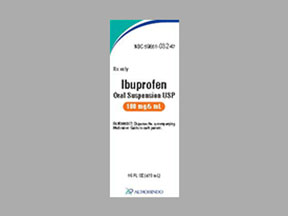
Cvs Childrens Ibuprofen Coupons & Savings Card – Discount Prices from $6.93
Brand for: Ibuprofen
Ibuprofen is used to relieve pain from various conditions such as headache, dental pain, menstrual cramps, muscle aches, or arthritis. It is also used to reduce fever and to relieve minor aches and pain due to the common cold or flu. Ibuprofen is a nonsteroidal anti-inflammatory drug (NSAID). It works by blocking your body's production of certain natural substances that cause inflammation. This effect helps to decrease swelling, pain, or fever. If you are treating a chronic condition such as arthritis, ask your doctor about non-drug treatments and/or using other medications to treat your pain. This form of ibuprofen is intended for use in children. Do not give this medication to a child younger than 2 years unless directed by the doctor. Check the ingredients on the label even if you have used the product before. The manufacturer may have changed the ingredients. Also, products with similar names may contain different ingredients meant for different purposes. Taking the wrong product could harm you.
Our Cvs Childrens Ibuprofen coupons are free to use. You can print the coupon, email it to yourself, or receive the Cvs Childrens Ibuprofen coupon via text message. To get your free discount, show the pharmacist your Cvs Childrens Ibuprofen savings card which has the discounted coupon price. Use our filters below to edit the prescription box to match your needs. The Cvs Childrens Ibuprofen prices will update based on your prescription needs. Above our Cvs Childrens Ibuprofen coupons, you can change the location to see pharmacy prices in other areas. Our prescription discount card will update online with the specific pharmacy costs associated with your edits. Be sure to text, email, or print the Cvs Childrens Ibuprofen savings card code that you need after editing the prescription box and location field. Show the discount card to your pharmacist before paying.
My prescription
Edit
118ML of 100MG/5ML, Ibuprofen (1 Bottle)
Select pharmacy

CVS
$21.72
COUPON PRICE
Walmart
$6.93
COUPON PRICE
Albertsons
$8.72
COUPON PRICE
Walgreens
$8.81
COUPON PRICECvs Childrens Ibuprofen savings card
Show this card to your pharmacist
Walmart
$6.93
BIN
ID
PCN
GRP
019876
LHA554B61B
CHIPPO
LHX
Powered by
Ibuprofen is used to relieve pain from various conditions such as headache, dental pain, menstrual cramps, muscle aches, or arthritis. It is also used to reduce fever and to relieve minor aches and pain due to the common cold or flu. Ibuprofen is a nonsteroidal anti-inflammatory drug (NSAID). It works by blocking your body's production of certain natural substances that cause inflammation. This effect helps to decrease swelling, pain, or fever. If you are treating a chronic condition such as arthritis, ask your doctor about non-drug treatments and/or using other medications to treat your pain. This form of ibuprofen is intended for use in children. Do not give this medication to a child younger than 2 years unless directed by the doctor. Check the ingredients on the label even if you have used the product before. The manufacturer may have changed the ingredients. Also, products with similar names may contain different ingredients meant for different purposes. Taking the wrong product could harm you.
Our Cvs Childrens Ibuprofen coupons are free to use. You can print the coupon, email it to yourself, or receive the Cvs Childrens Ibuprofen coupon via text message. To get your free discount, show the pharmacist your Cvs Childrens Ibuprofen savings card which has the discounted coupon price. Use our filters below to edit the prescription box to match your needs. The Cvs Childrens Ibuprofen prices will update based on your prescription needs. Above our Cvs Childrens Ibuprofen coupons, you can change the location to see pharmacy prices in other areas. Our prescription discount card will update online with the specific pharmacy costs associated with your edits. Be sure to text, email, or print the Cvs Childrens Ibuprofen savings card code that you need after editing the prescription box and location field. Show the discount card to your pharmacist before paying.
Our Cvs Childrens Ibuprofen coupons are free to use. You can print the coupon, email it to yourself, or receive the Cvs Childrens Ibuprofen coupon via text message. To get your free discount, show the pharmacist your Cvs Childrens Ibuprofen savings card which has the discounted coupon price. Use our filters below to edit the prescription box to match your needs. The Cvs Childrens Ibuprofen prices will update based on your prescription needs. Above our Cvs Childrens Ibuprofen coupons, you can change the location to see pharmacy prices in other areas. Our prescription discount card will update online with the specific pharmacy costs associated with your edits. Be sure to text, email, or print the Cvs Childrens Ibuprofen savings card code that you need after editing the prescription box and location field. Show the discount card to your pharmacist before paying.
Cvs Childrens Ibuprofen FAQs
Using the SaveHealth discount card, what is the price of Cvs Childrens Ibuprofen without insurance?
Using the SaveHealth discount card, the price of Cvs Childrens Ibuprofen without insurance is $6.93.
What is the price of Cvs Childrens Ibuprofen at CVS?
The price of Cvs Childrens Ibuprofen at CVS is $21.72.
What is the price of Cvs Childrens Ibuprofen at Walgreens?
The price of Cvs Childrens Ibuprofen at Walgreens is $8.81.
What is the price of Cvs Childrens Ibuprofen at Walmart?
The price of Cvs Childrens Ibuprofen at Walmart is $6.93.
